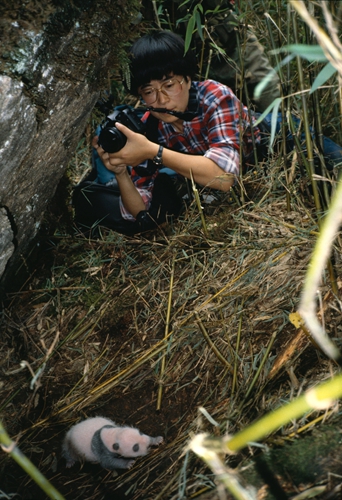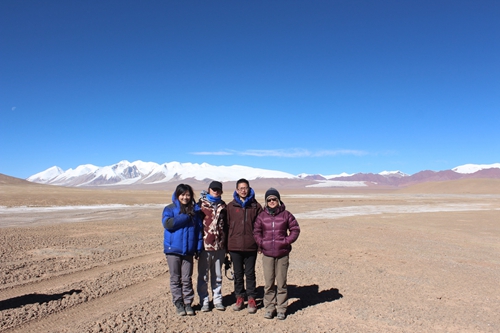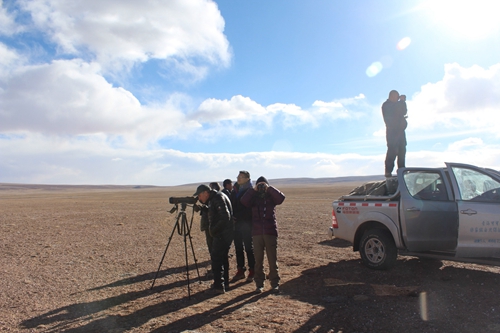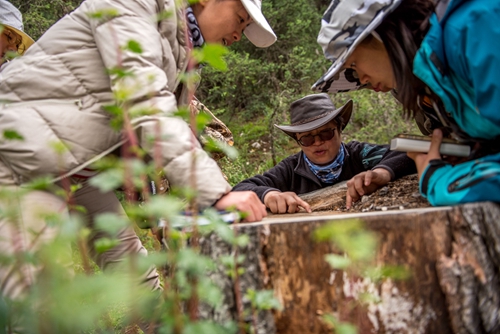Peking University, Sept. 25, 2017: “As head of the application expert team, Professor Lv Zhi has played a most vital and irreplaceable role.” Such was the commendation that headed a gratitude letter from the Qinghai Provincial Government to Peking University, when the world cultural heritage application of Hoh Xil was finally processed on July 7th, 2017.
The two adjectives employed in that letter, “vital” and “irreplaceable”, echo Professor Lv’s accomplishments as well as public admiration. She supervised and took an active part in the whole process, initiating the project, forming the research team, and reaching out to the World Heritage Centre.
Lv Zhi, born in 1965 in Lanzhou, Gansu, is a prominent figure in conservation biology at Peking University. After graduating from the Biology Department in PKU in 1985, she has dedicated her life to ecological conservation, and has made great contributions in environmental protection. She was commended as the Chinese version of Jane Goodall in her early years due to her illustrious success in the study of pandas.
Lv Zhi studying pandas on Mount Qin
Since 1995, Professor Lv Zhi has been closely involved in exemplary practices of natural conservation, implementing theory into practice. In 2007 she established Shanshui Natural Conservation Centre with her coworkers, focusing on the mankind-nature harmony of village life in the vast west of China. She initiated numerous projects with regard to the studies and protection of wild animals in the mountainous areas in the southwest, and was awarded as one of the most illustrious fifteen environmentalists around the world. Throughout these events, she kept up her enthusiasm and devotion in Hoh Xil.
"A Priceless Sample"
“Hoh Xil is definitely a worthy candidate for the title of a World Heritage Site in China.” Such were her words when asked about the initial motive of the project.
She first went to Hoh Xil back in 1997, and was deeply impressed with the vastness and naturalness of the land. “We usually hang around in the unpopulated zones; you could see animals and all that. It was amazing how such a massive piece of land could remain unblemished, and very awe-inspiring.”
Lv Zhi and her coworkers in Hoh Xil
Though the value of Hoh Xil has long been recognized, conservation work has been difficult and often thwarted. Poaching of Tibetan antelopes had been a grave concern, and was prevalent in the 90s. In 1994, Jiesang Suonandajie, a local fighter against the poachers, was found dead in the wilderness of Hoh Xil, frozen into an icy statue, still standing with arms up holding a gun. The incident aroused great attention on the environmental issues, and the Hoh Xil Reservation Area was set up three years later.
This precious land, however, is still in grave danger. Climate change has exerted great impact on the whole environmental system. The grassland is withering away, and precipitation has increased. The diversity of biological species has drastically declined. With more and more people coming in, the reserve is also faced with exploitation, which is a threat to the ecological system.
Lv Zhi observes, “To any country in the world, a whole piece of unpopulated land is a most invaluable asset, a priceless sample. When discussing climate changes, for example, we often have a hard time specifying the origins of those changes; in the case of Hoh Xil, we could have a sample, a natural reference. Such a place is a rare sight now.” The World Heritage Site application, therefore, is an opportunity to consolidate the protection.
"A Team Vital and Irreplaceable"
Thanks to the efficient and diligent work of the experienced team lead by Professor Lv, the whole process of the application took less than three years to finish; and the field investigation and material preparation took only seven months. When the project first kicked off, however, the researchers considered the task quite onerous. First of all, the application was bound to cause conflicts with the local government and residents, who were advocates of modernizing development and whose opinions must be heeded. The technological problems were another concern. It is not easy even to reach that lifeless land, let alone conduct research work. How to expound the uniqueness and value of the land was another troubling matter: the writing of the application materials was not to be trifled with.
Lv’s team doing research in Hol Xil
Professor Lv’s unique experiences contributed to her team’s effective solutions to problems and successful application for a World Heritage Site.
She has worked in Qinghai Province for many years. She went to Hol Xil for the first time in 1997. And her team goes to the Three-River district almost every year. The work in Three-River District includes mainly two parts: scientific research and community protection. The scientific research she accomplished over the years provided her team with extra information to resort to, so that urgent wild searches wouldn’t be the sole channel for information when needed. Meanwhile, the data she accumulated also enabled the application team to find the most valuable assets of Hol Xil which lives up to the two criteria of the World Heritage Centre — “to contain superlative natural phenomena or areas of exceptional natural beauty and aesthetic importance” and “to contain the most important and significant natural habitats for in-situ conservation of biological diversity, including those containing threatened species of outstanding universal value from the point of view of science or conservation”.
The community protection work she did enabled her to better comprehend the local government and residents. “Most local residents are Buddhists. They have inherent beliefs about environmental protection, but they were not organized, or we can say they didn’t obtain the identity to perform them.” Professor Lv added, “Since 2005, the most important thing we did was to advocate within the authority and the Three-River District to warrant community protection. Later, we helped with the training.” The local residents have great trust in them. In 2016, the pilot project of the park system in this district was launched. As first of its kind in the nation, the project aims to make more than 16,000 herdsmen participants of park management, absorbing more people into the protection career.
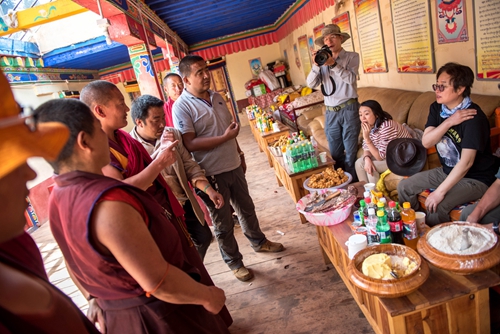
Professor Lv’s team making door-to-door interviews in Yushu, Qinghai
Another unique experience is that Lv Zhi used to be involved in much heritage-related work. As a former member of the heritage work unit in the World Conservation Union, she evaluated world natural heritages many times and became familiar with the procedures and requirements for an application. “I’ve been a judge myself, so I know where to pay attention, which sure contributes to the smooth application.” The rich experience in international organizations facilitates her communication with the judges. She was also the host for the assessor committee when they came to review.
“Professor Lv played an essential role through the whole process of heritage application. She offered us both general technical advice and specific suggestions towards different problems. When the work finished, she presented more advice on environmental renovation and the establishment of Yushu Museum.” Kang Xuelin, manager of Qinghai Heritage Application Office concluded.
"One of the harshest environments"
To a scientific research team, the adverse working conditions presented a bigger challenge compared to technical ones. “It probably is one of the harshest of all environments.”
Professor Lv conducting research in Qinghai
In Hol Xil, most places are above the altitude of 4,500 metres, some reaching more than 5,000 metres. “It’s extremely cold here, and the thin air with an oxygen content only 60% the normal level compels you to take a breath every a few steps. Prior to the establishment of a working station, we could only sleep in tents. The circumstances here allowed me to build muscles in a month.” Professor Lv jokingly said. It’s nothing strange to be dealing with sudden attacks from wild yaks or to set tents in strong gales in Hol Xil.
“Hope that more people would join in environmental protection.”
Professor Lv Zhi possesses both charm and charisma. Apart from experts such as Li Jianghai and Wen Cheng, who took part in the research work, her team also includes a dozen of her students. Many students chose this career under her influence, through her books or her stories. This year, Li Yuhan, a graduate from Peking University Yuanpei College, turned down offers from Columbia University and Oxford University and chose to work at the frontline in the Three-River District. Professor Lv thinks that environmental protection is the concern of everyone, and hopes that more people can join in the practice of protecting the environment.
Lv’s Team attending the Nature Observation Day in Yushu, Qinghai
In Professor Li’s view, humans are not superior than other species, but we possess the ability to exert influence. It’s humans who can choose either to protect or to destroy, who caused the dilemma of protection. “What I’ve been thinking about recently is what part we ourselves should truly play in nature.”
Written by: Ma Xiao, Wang Xi
Edited by: Fu Wenyun, Karen Xu
